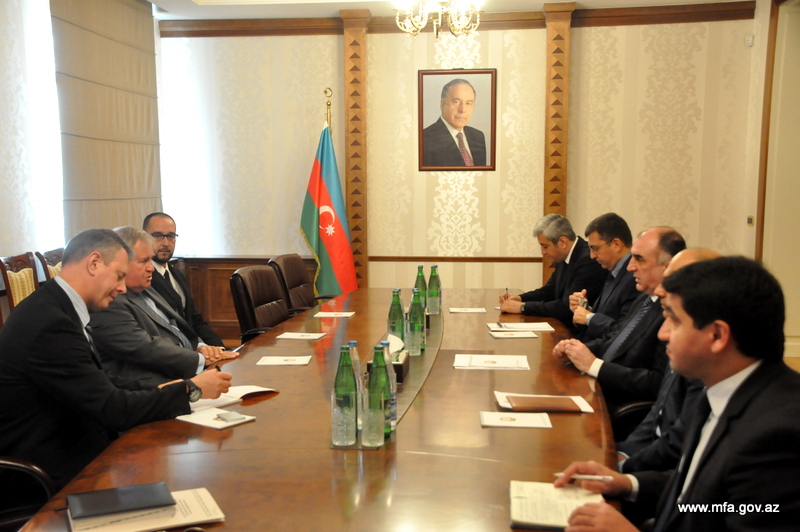Int’l community sees phased settlement of Nagorno-Karabakh conflict as possible solution

By Sara Rajabova
The settlement of the long-standing Armenian-Azerbaijani Nagorno-Karabakh conflict continues to linger due to Yerevan’s destructive position in the negotiations process.
Armenia has blocked all routes to peace and this occupant country has attempted maintain the status quo for several years, perpetuating its occupation of 20 percent of Azerbaijan’s internationally recognized territories.
Azerbaijan’s Foreign Minister Elmar Mammadyarov has said the presence of Armenian troops in the occupied Azerbaijani territories is the main obstacle for the settlement of the conflict.
He made the remark at a September 15 meeting with Robert Walter, PACE’s Political Affairs Committee’s rapporteur on Nagorno-Karabakh, while discussing the ongoing negotiations over the Armenian-Azerbaijani conflict, the ministry reported.
Mammadyarov recalled the fact that Armenia’s actions in Nagorno-Karabakh and the seven surrounding regions is fully recognized as an occupation by the international community, including the OSCE Minsk Group co-chairs.
He added that UN Security Council Resolutions No.822 (1993), 853 (1993), 874 (1993), 884 (1994) condemn the use of military force against Azerbaijan and the occupation of its territories, confirming the sovereignty and territorial integrity of Azerbaijan as well as the inviolability of its borders.
Emphasizing that Nagorno-Karabakh is part of Azerbaijan, a fact that is upheld by UN Security Council resolutions, the minister said the resolutions demand the immediate, complete, and unconditional withdrawal of occupying forces from all of the invaded Azerbaijani territories.
A precarious cease-fire between Azerbaijan and Armenia was reached after a lengthy war that displaced over a million Azerbaijanis and has been in place between the two South Caucasus countries since 1994.
Though 20 years have passed, Armenia has not yet implemented the U.N. Security Council's four resolutions on its pullout from the neighboring country's territories so far.
Mammadyarov went on to say that the withdrawal of the Armenian armed forces from the occupied territories would serve the return of refugees and internally displaced persons, restoration of communications, establishment of confidence, and the restoration of peace and security in the region; and that it is only Armenia stands against this requirement.
Noting that the updated Madrid principles cover these points, Mammadyarov said the international community accepts a phased settlement of the Nagorno-Karabakh conflict as a possible means of resolution.
Peace talks over the long-lasting Nagorno-Karabakh conflict are underway on the basis of the Madrid principles, proposed by the Minsk Group co-chairs. However, as Armenia continues to follow non-constructive position, the negotiations have been largely fruitless so far despite the efforts of the co-chair countries over 20 years.
Mammadyarov further stated that the June 16 judgment by the Grand Chamber of the European Court of Human Rights on the "Chiragov and others v. Armenia" case was yet another impressive response to Armenia regularly denying its illegal occupation of Azerbaijani lands and military presence in these territories.
The ECHR reaffirmed Armenia’s responsibility in the occupation of Azerbaijani territories. The court ruled in favor of the applicants, recognizing Armenia’s continuing violations of their rights under the Convention for the Protection of Human Rights and Fundamental Freedoms.
Mammadyarov also lambasted the settlement of Armenian refugees from Syria in Azerbaijan’s occupied Nagorno-Karabakh region.
He stressed that by changing the demographic composition of Azerbaijan’s occupied territories and settling Armenian refugees from Syria into these territories, Armenia flagrantly violates its commitments to the Geneva Convention.
He noted that this issue would be raised before the OSCE Minsk Group co-chairs and international organizations.
Armenian authorities’ settling Syrian refugees on the occupied Azerbaijani territories constitutes an international crime, since the settlement of the refugees in disputed territories is not acceptable under international law.
Azerbaijan has repeatedly warned that the settlement of refugees in occupied territories is a very dangerous process with unpredictable consequences.
Mammadyarov further said consultations and informative meetings held by the OSCE Minsk Group co-chairs in Vienna with the participation of other Minsk Group members are a positive factor.
He added that all members of the OSCE Minsk Group, as well as the corresponding international organizations should contribute to the settlement of the conflict based on the norms and principles of international law and the UN Charter.
During the visit to Azerbaijan, PACE Rapporteur Walter will carry out a fact-finding visit to the area of the contact line in the Nagorno-Karabakh region on September 15-16, PACE reported.
--
Sara Rajabova is AzerNews’ staff journalist, follow her on
Twitter: @SaraRajabova
Follow us on Twitter @AzerNewsAz
Here we are to serve you with news right now. It does not cost much, but worth your attention.
Choose to support open, independent, quality journalism and subscribe on a monthly basis.
By subscribing to our online newspaper, you can have full digital access to all news, analysis, and much more.
You can also follow AzerNEWS on Twitter @AzerNewsAz or Facebook @AzerNewsNewspaper
Thank you!
